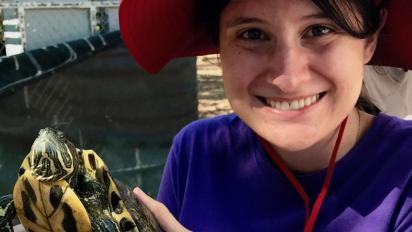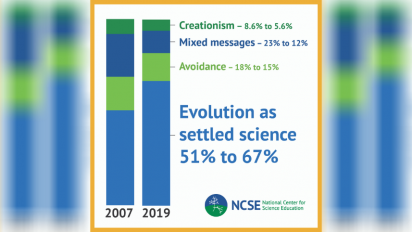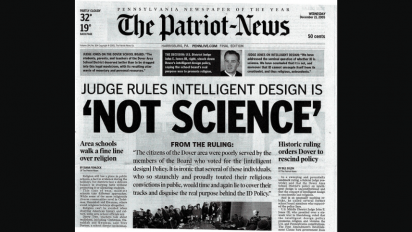Who says there’s no good news these days? In June 2020, the peer-reviewed journal Evolution: Education and Outreach published “Teaching evolution in U.S. public schools: a continuing challenge,” by Eric Plutzer of Penn State University and Glenn Branch and Ann Reid of NCSE, which discussed the results of a rigorous national survey of public high school biology teachers. Conducted in 2019, the survey was designed to replicate a similar national survey conducted by Plutzer and his colleagues in 2007.
By the way, since 2020 is the fifteenth anniversary of the Kitzmiller v. Dover trial, it is worth noting that Plutzer and his colleagues were prompted to launch their survey in 2007 in part because they were intrigued by the events taking place a hundred miles to their southeast in Dover and Harrisburg (where the trial itself was conducted) and wondered how evolution was taught in public high schools in general. So the Kitzmiller plaintiffs are partly to thank for the 2007 survey and for the 2019 replication!
Comparing the results of the two surveys is heartening. In particular, the proportion of teachers who reported emphasizing evolution while giving no credence to creationism rose from a bare majority, 51 percent, to a commanding majority, 67 percent. Mean- while, the proportion of teachers who avoided endorsing evolution or creationism fell from 18 to 15 percent, the proportion of teachers who endorsed both evolution and creationism fell from 23 to 12 percent, and the proportion of teachers who endorsed only creationism fell from 8.6 to 5.6 percent.
What accounts for the improvement? Plutzer, Branch, and Reid argue that improvements in the treatment of evolution in state science standards, and in particular the debut of the Next Generation Science Standards in 2013, played a substantial role. The NGSS include “Biological Diversity: Unity and Diversity” as disciplinary core idea of the life sciences at both the middle and high school levels. By now, 20 states (plus the District of Columbia) have adopted the NGSS.
Strikingly, although in 2007 the states that would later adopt the NGSS had the smallest proportion (49.7 percent) of teachers who reported endorsing evolution and not creationism, in 2019 they had the largest proportion (68.9 percent) of such teachers. Teachers in NGSS states reported having taken more pre-service and in-service coursework in evolution than their colleagues elsewhere. Evidently the increased expectations of the new standards impelled both novice and veteran teachers to upgrade their content knowledge of evolution.
NCSE was of course eager to spread the good news. Ann Reid contributed a commentary to the journal Nature, in which she stressed the role of the scientific community in helping to support the development, adoption, and revision of improved state science standards, while Glenn Branch contributed a special report on the survey to Skeptical Inquirer. Reid and Branch also contributed posts to the blogs of the American Society of Cell Biology, BMC On Society, the National Science Teaching Association, and Scientific American.
There was bad news too, to be sure. After all, the survey revealed that more than one in six high school biology teachers, 17.6 percent, are presenting creationism as a scientifically credible alternative to evolution. Unsurprisingly, 60 percent of them turn out to be creationists themselves. And almost as many, 15 percent, are failing to emphasize the broad consensus on evolution, despite the fact that their professional organizations such as the National Association of Biology Teachers regard evolution as indispensable in teaching biology.
Still, the attainability in a mere dozen years of substantial improvements in science education, even for a notoriously socially contentious topic like evolution, is encouraging. It shows that NCSE’s efforts to defend and promote the teaching of evolution—aided, of course, by the work of our members, of allied organizations, and of uncounted scientists, educators, policymakers, administrators, and concerned citizens in general—are effective. And it suggests that, consistently pursued, they will continue to be effective in the future.
This article has been modified slightly from its original print format.








